The Treasure of the Minaret
Reading Time: 11 min
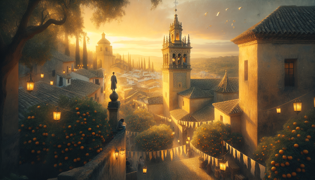
About Story: The Treasure of the Minaret is a Historical Fiction Stories from spain set in the Medieval Stories. This Descriptive Stories tale explores themes of Romance Stories and is suitable for All Ages Stories. It offers Cultural Stories insights. A medieval Mudejar custom in Salares where suitors bid atop an ancient minaret to win a bride and fund village festivals.
Introduction
Beneath a sky brushed in apricot hues, the slender silhouette of Salares’ Mudejar church rose like a silent sentinel over olive groves and terracotta roofs. Its former mosque’s minaret, now crowned by a weathered belfry, bore witness to countless sunsets, each one painting its carved bricks with liquid gold. On the eve of El tesoro del alminar, a custom as old as the stones themselves, the village stirred like a pot of fragrant puchero. The scent of orange blossoms drifted through the narrow callejones, mingling with the sharp tang of aged leather and the distant murmur of guitars tuning under flickering lantern light.
Every spring, when milagro y promesa danced in the warm breeze, the minaret transformed into a stage where suitors offered not only coin but devotion. From peasant lads with rough hands to noble hidalgos clad in velvet, each climbed the spiral staircase to stake a claim in the heart of a bride-to-be. Their bids were more than sums of gold; they were poems whispered to the wind, promises shaped from dreams. The whole village, from youngest niño to oldest abuela, gathered in the plaza like bees to a hive, buzzing with anticipation, ready to bless the chosen union and to rire unas risas bajo la luna.
Tonight, in the hush before dawn, torches flickered and banners fluttered like butterflies caught in a gentle gale. The air tasted of sweet almonds crushed underfoot, and every voice carried the hushed thrill of ancient lore. Somewhere in the shadows, a lone clarinet breathed a melancholy tune, its notes drifting like ghostly swallows at dawn. This was the moment when tradition met desire, when a promise made atop cold stone could shape destinies. In that stirring hush before the bidding began, hearts thumped like distant drums, echoing against the walls of time.
Whispers of an Ancient Minaret
High above the plaza, the minaret’s stones held secrets as tightly as a miser clutching gold. Each brick was carved with patterns that told of a past when prayers rose from these very heights toward a sky unbroken by cathedral bells. The transition from mosque to church left faint echoes—an arabesque swirl here, a half-hidden star there—whispering of shared faiths and shifting masters. Dust lay upon the steps like a veil, and every footfall stirred memories that drifted away on the dry wind. A stray cat padded by, its fur smelling of warmed basil and dusty sand.
The villagers spoke of the minaret in hushed tones, as if the stones still listened. Old tales described how two families once locked horns over a bride so fair her laughter could outshine the dawn. The patriarchs agreed that whosoever offered the greatest gift atop the tower would win her hand. So the contest was born, forging a custom that endured when hopes and harvests faded alike. In Salares, bidding on a bride was as much a vote of confidence in the future as it was an act of devotion—an offering poured into the village’s communal chest to light candles, mend roofs and fill the tapas table at fiestas.
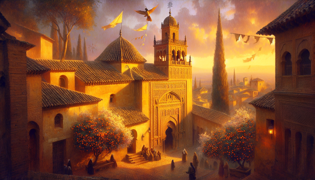
Marina, the miller’s only daughter, slept fitfully on this eve. Her dreams were embroidered with birdsong and the tang of sea salt carried inland on rare gusts of breeze. She felt her heart beat like a dervish’s drum—unsteady, urgent—while memories of her grandfather’s tales wrapped around her thoughts. He whispered that love and courage were twin stars, guiding any soul brave enough to climb toward them. Marina wondered which suitor might dare to ascend for her, to place his pledge like a treasure chest at her feet and to win her smile with more weight than any gold coin.
At the base of the tower, lanterns were struck and arranged in spirals that radiated outward like the petals of an open blossom. Villagers gathered, and their chatter rose and fell like the tide. Children tumbled in the plaza, their laughter a soundtrack of promise. In the warm air, someone struck a guitar chord so vibrant it felt like the earth itself exhaled. Smells of fried churros and roasted peppers wove through the crowd. The minaret loomed silent, a lighthouse of stone waiting to receive hearts daring enough to surrender them. There, love was neither bought nor sold but pledged, and every promise carried the weight of community hopes, as steady as the tide.
Suits Under the Andalusian Sky
As dawn unfurled its rosy fingers across the horizon, the plaza pulsed with urgency. Suitors emerged, each carrying a bundle wrapped in cloth or a satchel brimming with coins and parchment. Don Álvaro, the local apothecary with ink-stained fingers, bore a meticulously written poem. His words wove around Marina’s name like ribbons in a breeze, promising loyalty as fresh and fragrant as orange blossom honey. Nearby, young Mateo, a fisherman with arms like gnarled ropes, held aloft a pot of rare herbs known only to the marshlands beyond the hills. The scent of smoldering thyme drifted from his offering as if tasting the wind.
Above them, the minaret’s spiral staircase gleamed faintly where the first rays caught the polished stone. Up there, a suitor’s courage could flicker like a candle in the draft or burn firm and bright. Each man studied the path upward, weighing ambition against fear. Some fingers lingered on cool wrought-iron railings, feeling the faint tremble of centuries beneath their grip. The sky was a canvas brushed with peach and lavender, the breeze carrying distant bleats of goats on terraced slopes.
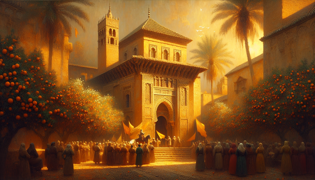
The bidding began with a trumpet’s clarion call, and Don Álvaro ascended. With each step, his breath hitched, and the parchment trembled as if alive with expectation. Paula, the barber’s daughter, pressed her palm to her lips as tears glistened like dew on her lashes. The village elders watched from shadowed doorways, invoking prayers both soft and urgent. “Tirar de la manta,” someone whispered, urging the suitors to reveal hidden valor. In that moment, every spectator felt the past and future twist together like vines around ancient olive trunks.
When Don Álvaro reached the summit, he bowed before Marina with a flourish. His poem unfurled, echoing against stone like a melody carried on a breeze. Below, a silence fell so profound it seemed to hold its breath. Then came the murmur of coins clinking as Mateo took his turn. He offered an amulet of silver and lapis, said to bring protection to any heart wrapped in its embrace. The crowd leaned in, faces alight with wonder and debate. Somewhere a bell tinkled, a reminder that rituals held power as profound as any blade. The sun climbed higher, warming skin and spirit alike, and the bidding surged onward under the Andalusian sky.
Bids of Heart and Hearth
By midday, the custom had drawn every face in Salares toward the plaza like magnets. Each suitor’s ascent was a thread woven into a tapestry of hopes, vibrant as a flamenco dress swirling in sunlight. Lina, the baker’s granddaughter, offered fresh loaves glazed with honey and almonds, the aroma rich and sweet as her laughter. The fragrance drifted through the square, prompting hungry murmurs. Others came bearing tapestries stitched with scenes of the Sierra Almijara, or jars of preserved lemons and home-pressed olive oil whose scent was as sharp as youthful longing.
Across the square, whispers of jealousy and admiration rose and fell like waves. Murmured admonitions cautioned against wild bids, as if one false step might topple the delicate balance of tradition. Still, the suitors pressed on. Some spoke aloud their intentions, while others performed small feats—strings plucked on a guitar, poems recited in low voices, hearts bared a pecho descubierto. In that crucible of passion and pride, each man measured value not by weight of gold but by sincerity of offering. A promise etched in wood, a song strummed under a halo of sunbeams, each became a gem in the crown of collective memory.
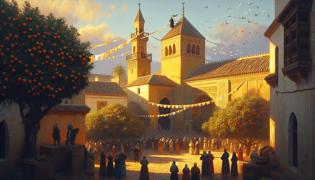
A hush descended when Don Rodrigo, last year’s triumphant bidder, appeared. His cloak of deep indigo traced patterns like rippling water, and the scent of night-blooming jasmine seemed to cling to his shoulders. He climbed with assured grace, his silhouette framed against whitewashed walls and blue sky. At the top, he presented a finely wrought lamp of brass from distant Córdoba. Marina felt her pulse quicken, as if his gift had lit a candle inside her. Her heart was a flame dancing in the wind.
Cheers echoed when the final bid closed, and the winner knelt on the summit to hold Marina’s hand. Below, villagers released a jubilant cry that rattled clay jars on nearby stalls. The bride-to-be descended the steps flanked by her chosen champion, while fireworks ignited the afternoon light. The mingled scents of roasted almonds and gunpowder filled the air, and drums rolled like thunder in celebration. In this swirl of festivity, love and community merged until every heart swelled like a summer cloud ready to burst.
A Promise Forged in Stone
As dusk cloaked the village in violet shadows, lanterns flickered along the walls, casting dancing patterns that looked almost alive. Within the church’s nave, the bride and her suitor knelt before the altar, their vows echoing off frescoed arches like twin birds in flight. Candles glowed on wrought-iron candelabras, and the air held the scent of incense warmed by hidden hearths. The stone beneath the couple’s knees was worn smooth by generations, as if the very ground bore witness to countless promises.
Outside, the plaza glowed with lanterns swaying in the breeze. Tables groaned under plates of paella scented with saffron and simmering broth, each grain a testament to toil and taste. Wine flowed like quicksilver in crystal flutes, its bouquet of dark berries and sun-warmed grapes stirring laughter and song. A group of old friends huddled under a wooden awning, their chatter轻轻上扬, reciting lines of poem and proverb, sometimes getting caught in “estar en misa y repicando” as stories ran ahead of time.
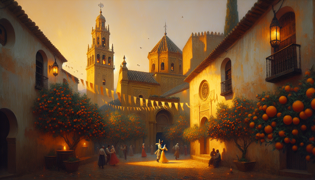
Later, as the newlyweds danced to the guitarra’s plaintive wail, lantern light glinted off Marina’s cerulean gown like droplets of seafoam. Her eyes shone with tears and triumph. Villagers moved in a whirl around her, children spinning like leaves caught in an eddy. Every footstep had the confidence of ancestors whose joys and sorrows flowed through these festivities like an unbroken river.
Long after midnight, when the final notes drifted away and the last embers of fire cracked softly, the village fell into a contented hush. In the hush, the minaret stood sentinel once more, its silhouette etched against a star-dusted sky. It had witnessed a treasure in gold and gifts, but more precious still, it had sealed a promise forged in stone and shared by an entire community. Tomorrow, when orange groves awoke to birdsong, life in Salares would continue—roads to repair, olives to press, bread to bake—but each soul would carry the echo of this night, a spark of unity as enduring as the ancient minaret itself.
Conclusion
Morning light filtered through olive boughs as Marina slipped from her bridal chamber. The smell of fresh bread and bloom-laden orange trees greeted her like an old friend. In the plaza, villagers in aprons and leather boots swept confetti from cobblestones, their laughter low and content. The minaret, draped now with wildflower garlands, cast a slender shadow that stretched east toward the sun. By midday, the bustle would resume—fields to tend, fountains to mend, prayers to intone—but for now, the village savored the echoes of last night’s magic.
Down in the church, a single candle flickered on the altar, its flame steadier than any heart that had climbed those spiral steps in search of love. Every etched brick of the minaret held a story of devotion, each layer of dust a memory of whispered oaths. When Mariners of Mercy and Fields of Faith are drawn together by tradition and hope, they craft a legacy stronger than gold. As Marina watched her husband join the morning circle, she knew that El tesoro del alminar was more than custom. It was the living pulse of Salares—a reminder that community, like love, is a treasure forged in stone and carried forward on wings of shared promise.

















